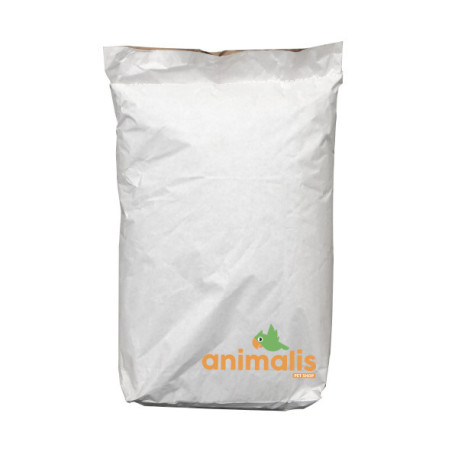





Reference: SOJA25KG
Soybeans are an excellent source of iron, zinc, manganese, copper, selenium, potassium, vitamins, fiber, polyunsaturated fatty acids and antioxidants, in short, it is an excellent dietary supplement.
Soybeans are often used in sprouting seed mixes.
Soybeans are an excellent source of iron, zinc, manganese, copper, selenium, potassium, vitamins, fiber, polyunsaturated fatty acids and antioxidants, in short, it is an excellent dietary supplement.
Soybeans are often used in sprouting seed mixes.
Basil 1kg
Basil contains many antioxidants, is anti-inflammatory, and helps against stress. This does not mean that basil is considered a medicine. Dried basil is of course also different from fresh basil plants. But the fact remains: basil is good for health.
Soya beans are an excellent source of iron, zinc, manganese, copper, selenium, potassium, vitamins, fibres, polyunsaturated fatty acids, and antioxidants; in short, they are an excellent dietary supplement.
Soya beans are often used in sprouting seed mixes.
Hemp seeds are highly nutritious and contain more essential fatty acids (EFAs) than any other source and are in second place, after soya, for their richness in highly digestible proteins, of high biological value. They are particularly recommended during the breeding seasons in order to stimulate the reproductive instinct of birds.
The evening primrose is an annual or biennial, rustic, which can be found naturally at the edge of paths near the Atlantic and Mediterranean coasts but also on the embankments of railways. Its erect stems are lined with large rosettes of downy leaves veined with red, between 10 and 30 cm long, oblong in shape, lanceolate, toothed, a little sticky.
Yellow millet is rich in vitamins and minerals and is an alkaline (non-acidic) cereal. It is part of the basic diet of parakeets, exotic birds and exotic doves.
Millet contains magnesium, phosphorus, iron, potassium, manganese, vitamin A, vitamin B1, vitamin B2, vitamin PP (nicotinic acid) and vitamin B5.
Niger, birdseed rich in phosphorus and calcium. Niger seeds (or nyjer seeds) are fine seeds rich in oil. They come from Guizotia abyssinica (also known as Guizotia oleiferous). The niger is highly prized by most birds, goldfinches and siskins love it.
The seed is mainly grown in India, Burma, Ethiopia and Nepal. Niger is an oilseed with a high fat content (38-43%) and protein content (23%). It provides quality food for all species of wild and forest birds, both in dry and sprouted form.
Niger is one of the few birdseeds with a good ratio of calcium to phosphorus.
They have the property of binding to minerals such as calcium, iron and zinc and making them less bioavailable.
The flaxseed consists of 40 to 45% oil and 25% protein. Flaxseed preserves very well. It contains, in particular, two fatty acids with similar names (both derived from the word "lin"), linolenic acid (an omega-3) and linoleic acid.
The seed is used in animal feed, particularly for laying hens for which an increase in the omega-3 content of the eggs is desired.
Due to these properties, this seed aids digestion.
Canary grass is a nutritious seed particularly appreciated by many birds. Its high protein and fibre content makes it an essential food for the good health and vitality of birds. It is especially ideal for canaries, budgerigars, serins, and other small exotic birds.
Characteristics:
- Ingredients: 100% natural canary grass.
- Appearance: Elongated seeds, from pale yellow to light brown in colour.
- Nutritional Value: Rich in proteins (about 16%), fibres, and essential amino acids.
- Benefits:
- Promotes good digestion thanks to its fibre content.
- Contributes to the shine of plumage.
- Provides the necessary energy for birds' daily activities.
Buckwheat is a nutritious seed often included in the diet of cage and aviary birds.
- Appearance: Buckwheat is a triangular seed, light brown to greyish in colour, with a slightly rough shell.
Benefits for Birds:
- Balanced Nutrition: Buckwheat offers a combination of proteins, carbohydrates, and fibres, contributing to a balanced diet.
- Energy: The complex carbohydrates provide a sustainable source of energy for the birds' daily activities.
- Digestive System: The fibres promote good digestion and a healthy intestinal regulation.
- Proteins: The proteins in buckwheat support growth, reproduction, and the maintenance of muscle mass in birds.
Yellow millet is rich in vitamins and minerals and is an alkaline (non-acidic) cereal. It is part of the basic diet of parakeets, exotic birds and exotic doves.
Millet contains magnesium, phosphorus, iron, potassium, manganese, vitamin A, vitamin B1, vitamin B2, vitamin PP (nicotinic acid) and vitamin B5.
Clover stimulates the immune system and slows down cellular ageing through its excellent antioxidant properties. Rich in vitamins B, C, E and provitamin A.
Peeled peanuts are treats highly appreciated by parrots.
They should be distributed sparingly as they are rich.
An ideal food to fill your feeders for wild birds, they will provide the necessary fat for birds to get through the winter more easily.
A favourite of tits and a real delicacy for many birds.

Soybeans are an excellent source of iron, zinc, manganese, copper, selenium, potassium, vitamins, fiber, polyunsaturated fatty acids and antioxidants, in short, it is an excellent dietary supplement.
Soybeans are often used in sprouting seed mixes.
